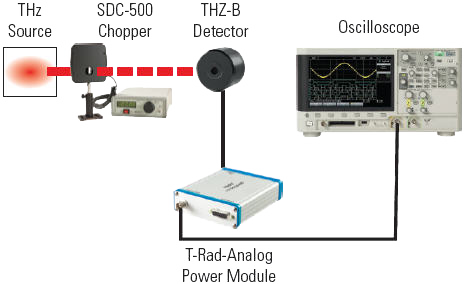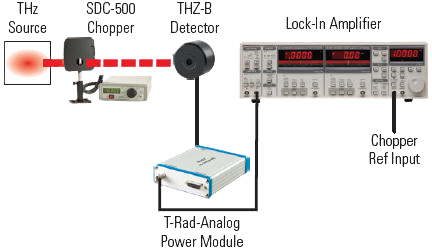
THZ5B-BL, THZ9B-BL
2D CAD file (PDF)
- 9169
- English
THz detector for power measurements up to 125 µW.
Broadband, room temperature operation, easier to use and less expensive than a Golay cell
With state of the art pyroelectric sensors, measure down to 50 nW with 1 nW resolution.
Choice of 5 mm and 9 mm diameter
THZ-B detectors are calibrated at a single wavelength (0.63 µm) and include typical wavelength correction data from 0.25 to 440 µm. They are used for relative measurements outside that range.
All THZ-B detectors require the use of an optical chopper, like our SDC-500, to sync the signal at either 5 Hz (DA models) or 25 Hz (DZ models).

Analog (BNC) power module, to interface THZ-B heads with oscilloscopes and lock-in amplifiers.

Pelican carrying case. Various sizes available. Contact us to order.

Interchangeable window for use with THZ-B and THZ-I-BNC detectors. Various materials available. Contact us for full list...
There is no user manual available for this product.






There is no document to download for this product. Contact us for technical details.

Here is a basic analog set up that would be useful if the optical power of the source was about 5 µW or greater. The output of the THZ5B-BL-DA detector would be approximately 600 mV @ 5 Hz chopping frequency, giving plenty of signal for an oscilloscope. Simply read the voltage output and divide by the Rv factor (V/W) of the detector to measure the intensity of the source in Watts. Also consider applying a wavelength correction factor under certain circumstances.

This is another analog set-up option that we recommend if you have to measure very low power levels (i.e. less than 5 ?W) where the signal may be buried in the broadband noise. The voltage output of the analog THZ-B-DA detector, powered by our T-RAD-ANALOG, is routed to the Lock-In Amplifier input, and the Sync Output of our SDC-500 Chopper is connected to the reference input. The Lock-In Amplifier will lock on the chopping frequency and you can dial in a long integrating time and measure a very low RMS voltage. The voltage divided by our Voltage Responsivity (V/W) equals the power of the source.
*Does not include shipping fees, import fees or local representation. Request quote for full details and local sales contact.
You might need these specific products to be able to use the placeholder only.
No compatible product